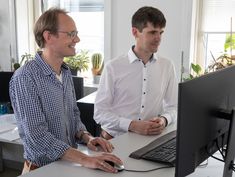New CD Laboratory
Life sciences: artificial intelligence to predict drug properties
On December 7, 2022, the new Christian Doppler Laboratory for Molecular Informatics in the Life Sciences (CD-Lab MIB) will open. Under the leadership of Johannes Kirchmair from the Department of Pharmaceutical Sciences at the University of Vienna, innovative machine learning methods will be developed for modern drug discovery. In parallel, scientists at the University of Natural Resources and Life Sciences Vienna (BOKU) are researching simulation methods for molecular structure-based processes. Thus, experts from biology, chemistry, pharmacy and computational sciences work together in an interdisciplinary way. Corporate partners from industry are Boehringer Ingelheim RCV and BASF SE. The most important public funding source is the German Federal Ministry of Labor and Economics (BMAW).
Artificial intelligence and modern simulation methods are playing an increasingly important role in the life sciences. They are now used in virtually all phases of drug discovery and optimization. For example, the therapeutic efficacy and toxicological safety of drug candidates or the distribution and effectiveness of agrochemicals in crops can be predicted with increasing accuracy. However, the potential of these computer-based methods is still far from being fully exploited. One of the main reasons for this is that the development and validation of these methods are linked to the availability of large amounts of high-quality data, which are time-consuming and costly to collect and must comply with data protection regulations.
Molecular informatics to pave the way to innovative drugs
The goal of the new Christian Doppler Laboratory is to push the boundaries of machine learning and molecular simulation for predicting the biological and chemical properties of drug molecules. To achieve this goal, Johannes Kirchmair, head of the Research Group for Computational Drug Discovery and Molecular Design, and Thierry Langer, head of the Research Group for Chemical Informatics (both University of Vienna), and Chris Oostenbrink, head of the Research Group for Molecular Modeling and Simulation at BOKU, are working closely together. The scientists* will be able to draw on big data, research infrastructure and expertise from corporate partners Boehringer Ingelheim RCV and BASF SE. "In this CD lab, we will maximize the performance and applicability of computational methods by merging medicinal and agrochemistry, coupled with innovative algorithms," explains Johannes Kirchmair.
Chris Oostenbrink from BOKU explains: "Our module of the new CD Lab is mainly about structure-based modeling of active compounds. We will look at the interactions between potential active compounds and proteins, taking into account the structure and dynamics of proteins. We will use the latest methods to calculate the free energy of binding and also machine learning to better describe particularly complicated interactions. The research is cutting edge and we are particularly pleased that the company partners* see it that way, too."
Ministry promotes application-oriented basic research
"In recent years, Austria has developed into an important center of the European life science scene. A total of more than 900 companies from the biotech, pharmaceutical industry and medical technology sectors secure domestic jobs and drive the innovative strength of the country. The new CD Laboratory conducts research on modern active ingredients on the computer instead of in the laboratory. This is a topic of the future," says Eva Landrichtinger, Secretary General of the Federal Ministry of Labor and Economics. "The advantages are many: faster development cycles, optimized use of resources, lower costs and the chance to develop precision and personalized medicines. By researching the necessary fundamentals, this CD Laboratory will contribute to the future of drug development as well as to securing Austria as a life science and biotech location," Landrichtinger said.
About Christian Doppler Laboratories
In Christian Doppler Laboratories, application-oriented basic research is carried out at a high level. To this end, outstanding scientists cooperate with innovative companies. The Christian Doppler Research Association is regarded internationally as a best-practice example for the promotion of this cooperation. Christian Doppler Laboratories are jointly funded by the public sector and the participating companies. The most important public funding body is the Federal Ministry of Labor and Economic Affairs (BMAW).
The University of Vienna is one of the oldest and largest universities in Europe and the largest research institution and educational institution in Austria. Around 7,500 scientists work in networks at 20 faculties and centers on new solutions and make an important contribution to the further development of society. The newly opened CD Laboratory is already the eighth CD Laboratory at the University of Vienna.
With 2,200 scientists and 11,000 students, BOKU is one of the leading life sciences universities in Europe. Thanks to the combination of natural sciences, technology and social and economic sciences, research and teaching are characterized by a holistic approach to problems. At the University of Natural Resources and Applied Life Sciences Vienna there are currently five CD laboratories and three external modules.

